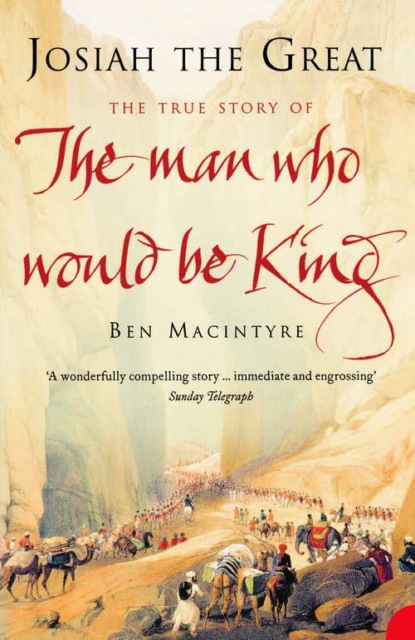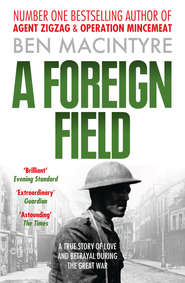По всем вопросам обращайтесь на: info@litportal.ru
(©) 2003-2024.
✖
Josiah the Great: The True Story of The Man Who Would Be King
Настройки чтения
Размер шрифта
Высота строк
Поля
9 Courtier Of Lahore (#litres_trial_promo)
10 The Maharajah’s Ambassador (#litres_trial_promo)
11 The King’s Nearest Friend (#litres_trial_promo)
12 The Prince Of Ghor (#litres_trial_promo)
13 Prometheus From Pennsylvania (#litres_trial_promo)
14 A Grand Promenade (#litres_trial_promo)
15 Camel Connoisseur And Grape Agent (#litres_trial_promo)
16 Harlan’s Last Stand (#litres_trial_promo)
EPILOGUE KABUL, SEPTEMBER 2002 (#litres_trial_promo)
A Note on Sources and Style (#litres_trial_promo)
Notes (#litres_trial_promo)
Keep Reading (#litres_trial_promo)
Select Bibliography (#litres_trial_promo)
Index (#litres_trial_promo)
P.S. (#litres_trial_promo)
About the author (#litres_trial_promo)
Q & A with Ben Macintyre (#litres_trial_promo)
LIFE at a Glance (#litres_trial_promo)
Ten Favourite Books (#litres_trial_promo)
About the book (#litres_trial_promo)
A Critical Eye (#litres_trial_promo)
A Conqueror Gone Native (#litres_trial_promo)
Read on (#litres_trial_promo)
Have You Read? (#litres_trial_promo)
If You Loved This, You’ll Like… (#litres_trial_promo)
Find Out More (#litres_trial_promo)
Acknowledgements (#litres_trial_promo)
About the Author (#litres_trial_promo)
Also by the Author (#litres_trial_promo)
About the Publisher (#litres_trial_promo)
Maps (#ulink_5c6f9b3c-6d7d-53dc-bf01-3c98e1813014)
Preface (#ulink_96210c22-d538-5276-95cb-34777fb7a667)
In the winter of 1839 a conqueror, enthroned on a large bull elephant, raised his standard in the wild mountains of the Hindu Kush. His soldiers cheered, fired matchlock rifles into the air, and beat swords against their hide shields. Two thousand native horsemen shouted their loyalty, each in his own tongue: Afghan Pathans, Persian Qizilbash, Hindus, Uzbeks, Tajiks and Hazaras of the highlands, descendants of the Mongol horde. Six cannon roared to salute the flag, the echoes ricocheting across the snowy pinnacles.
The commander reviewed his troops with satisfaction. Although he was not yet forty, the face above the long black beard was as rugged as the landscape around it. Beneath a flowing fox-fur cloak he wore robes of maroon and green satin, a girdle of silver and lace, and a great silver buckle in the shape of a soldier’s breastplate. His catskin cap was circled with gold.
Like Alexander of Macedon, who had led his army on the same mountain path twenty-one centuries earlier, the leader was called great by his followers, and his titles, past, present and future, were many: Prince of Ghor, Paramount Chief of the Hazarajat, Lord of Kurram, governor of Jasrota and Gujrat, personal surgeon to Maharajah Ranjit Singh of the Five Rivers, the Highly Stationed One equipped with Ardour and Might, Chief of the mighty Khans, Paragon of the Magnificent Grandees, Holy Sahib Zader, Companion of the Imperial Stirrup, Nearest Friend of Shah Shujah al-Moolk, King of Afghanistan, Chief Sirdar and Commandant of the invincible armies of Dost Mohammed Khan, mighty Amir of Kabul, Pearl of the Ages and Commander of the Faithful. Hallan Sahib Bahadur, victor of the battle of Jamrud, slayer of infidel Sikhs, scourge of Uzbek slavers, was even said to have magical powers. Some claimed that he was an expert alchemist who had forged a priceless talisman to make the dumb speak and conjured gold from base metal, a teller of stories in every tongue, and master in the art of intrigue. In his own language, the prince was known by other names: doctor, soldier, spy, botanist, naturalist and poet; but also mercenary, even mountebank.
His Highness never travelled without his books, and when the guard had been posted for the night and the mastiffs howled to ward off the wolf packs in the ravines, he retired to his tent and wrote, tumbling torrents of words in a language none but he could read. In his journal he recorded: ‘I unfurled my country’s banner to the breeze, under a salute of twenty-six guns, and the star-spangled banner gracefully waved amidst the icy peaks, seemingly sacred to the solitude of an undisturbed eternity.’
For His Highness Hallan Sahib had another name, and another title: Josiah Harlan, Quaker, of Chester County, Pennsylvania.
Prologue (#ulink_92eaff38-9875-5fbc-953a-5c24c7654fdc)
In 1989, as an aspiring foreign correspondent, I was sent to Afghanistan to cover the final stages of the decade-long war between the Soviet army and the CIA-backed Mujahideen guerrillas. Afghanistan was then the crucible of the Cold War. Just as the Russians and British had tussled for pre-eminence there in the nineteenth century, in the undeclared war Rudyard Kipling called ‘The Great Game’, so the US and USSR fought for supremacy in the Afghan mountains at the end of the twentieth. The Soviets were losing, and would soon withdraw, leaving behind 50,000 dead soldiers and a million dead Afghans.
Having made arrangements to link up with one of the seven Mujahideen groups, I headed to Peshawar on Pakistan’s Northwest Frontier, forty miles from the Afghan border. Once a part of Afghanistan itself and the summer capital of the Afghan kings, Peshawar was the principal staging post in Pakistan for the anti-Soviet insurgency. The bazaar was thronged with tough-looking Pushtuns, the Afghan warrior tribe the British knew as Pathans, many with machine guns slung casually over their shoulders. An enterprising stallholder offered to sell me a captured Soviet tank. I settled instead for the standard Mujahideen outfit, obligatory for any ‘resistance tour’: Pathan pancake hat and dun-coloured saggy pyjamas, or shalwar kamiz, over which I wore the regulation foreign correspondent’s sleeveless jacket with many unnecessary pockets. I had already grown something that might pass for a beard.
At dawn the next day, a trio of armed Mujahideen knocked at the door of my hotel room and led me to a waiting Jeep. For the next twelve hours we drove up the Khyber Pass, and then onto rocky tracks which wound deep into the mountains, until we finally arrived at the camp of the Mujahideen commander Gulbuddin Hekmatyar. I was too callow to know it at the time, but black-bearded Hekmatyar was the most fundamentalist of the Mujahideen leaders, a man as ruthless as he was ambitious, whose brutal shelling of Kabul in the civil war that followed killed thousands of civilians and devastated the city. The entrance to his camp was marked by a lone sentry and a large, dead vulture, impaled on a post, the first victim I had seen of the Afghan war.
Over the ensuing weeks I was swept away by my own Afghan adventure. The Mujahideen fighters looked after me as one might a vulnerable and rather dim younger brother, and I filed breathless despatches for my newspaper, with rather too much emphasis on the first person. I thought myself very dashing indeed.
Returning to Peshawar after my first stint ‘inside’, I went to the American Club, the social hub of the Western crowd. The place was often frequented by journalists, young ones like myself but also scarred veterans, along with arms dealers, aid workers and monosyllabic Americans who were probably spies or mercenaries. Almost everyone had stories of night skirmishes and narrow escapes, the self-inflating chaff of the war zone. We were all living out our romantic fantasies in a land that invited and nourished them.
During the day we lounged around the pool, and relaxed by swimming, planning and Kipling. The works of Rudyard Kipling were required reading, for Britain’s bard of imperialism captured the wildness and wonder of the North-West Frontier like no other writer, before or since. It was in Peshawar, fresh from my first foray into Afghanistan, that I first read ‘The Man who Would be King’, Kipling’s timeless short story which John Huston would adapt into a film starring Sean Connery and Michael Caine. Written in 1888, when Kipling was just twenty-three and working as a journalist for the Allahabad Pioneer, ‘The Man who Would be King’ tells the tale of a bearded adventurer, Daniel Dravot, who penetrates the remotest mountains of Afghanistan in the middle years of Victoria’s reign, disguised as a Muslim holy man. Following the trail of Alexander the Great deep into the Hindu Kush, he trains a tribal army and is crowned king by the local tribesmen. Adopting the symbols of Freemasonry, he proclaims his own fake religion and is exalted as a living god until, like all who aspire to deity, he crashes to earth. It is thrilling stuff, a story of freelance imperialism in which a white man becomes a powerful potentate in a distant land, but also a cautionary tale of colonial hubris, ending in disaster. The narrator is a newspaperman, who hears the story from the adventurer’s dying partner. ‘The Man who Would be King’ made a profound and lasting impression on me.
Over the next few years I made several more reporting trips to Afghanistan, and twice visited Kabul, but after the Soviets retreated the West swiftly lost interest. The defeat of the Soviet army by the Afghan Mujahideen contributed to the collapse of Communism, but as Afghanistan fractured into civil war, the country was left to slide towards fundamentalism, eventually producing Islam’s most mutant form, the extremist, terrorist Taliban. Long before the rule of the Mullahs the news story had moved on – and so had I, to New York, then Paris, and finally to Washington. I returned to Britain just a few days before 11 September 2001.
In the wake of that atrocity, as America declared war on terrorism and the Taliban, I found myself writing about Afghanistan again, trawling through the histories to piece together a narrative of that broken land for my newspaper. While American ‘daisy cutter’ bombs were blasting al Qaeda fighters out of the caves of Tora Bora and special forces were hunting through the same Afghan hills I had known a decade earlier, I was combing the stacks of the British Library.
There was one name that caught my attention, deep in the footnotes of the books about nineteenth-century Afghanistan: Josiah Harlan, the first American ever to enter that country. A Pennsylvania-born Quaker and Freemason, Harlan had slipped into Kabul disguised ‘as a dervish’ in 1824, long before the British got there. He was said to have trained an army for the amir of Kabul, crossed the Hindu Kush, and proclaimed himself a prince in the mountains. His story sounded impossibly romantic, deeply implausible, yet strangely familiar.
I was not the first to notice the similarity between this life and Kipling’s short story. The US State Department précis on Afghanistan notes that ‘Josiah Harlan, an adventurer from Pennsylvania who was an adviser in Afghan politics in the 1830s, reputedly inspired Rudyard Kipling’s story “The Man who Would be King”.’ Harlan’s reputation would certainly have been known in Allahabad when Kipling was working there: the novelist adapted the American Freemason and former soldier into an English Freemason and former soldier, but the parallels between the real Josiah Harlan and the fictional Daniel Dravot, Kipling’s self-made King of Kafiristan, are too close to be coincidental.
There were tantalisingly few details about the life of the American, and the principal contemporary sources, almost all British, were conspicuously hostile. The first official British history of the First Afghan War (1839–42) dismissed him as ‘clever and unscrupulous … an American adventurer, now a doctor and now a general, who was ready to take any kind of service with any one disposed to pay him’. Harlan published only one book in his lifetime, a polemical anti-British tract. In 1939, more than sixty years after his death, a researcher pulled together some fragments of his unpublished work, but concluded that the bulk of Harlan’s writings – journals, letters and an entire manuscript recording his adventures – had all been destroyed in a house fire in 1929.
Harlan, it seemed, was doomed to remain a fleeting and enigmatic presence in history, a figure in fiction, but not in fact. Yet as American soldiers poured into Afghanistan at the beginning of the twenty-first century, this unwritten half-life seemed uncannily contemporary. Harlan had taken the pioneer spirit to a completely different frontier. Here was a wild west figure in the far wilder East, who had achieved the unique feat of voyaging over the sea to a ‘terra incognita’ and proclaiming himself a king. Yet in his own country he was entirely unknown.








